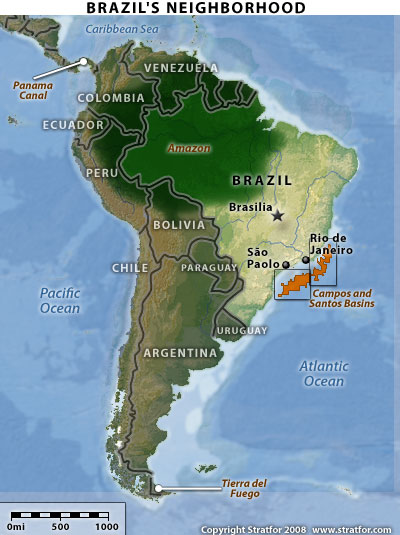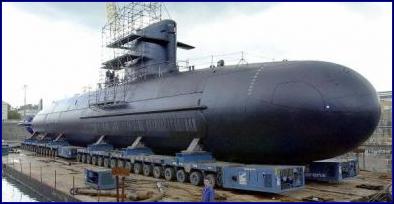September 23, 2008 | 2051 GMT |
||
|
Summary
The latest development in Franco-Brazilian military cooperation — French assistance in the development of naval nuclear propulsion — could signify an expanding defense relationship. The Brazilian defense minister has announced that a formal agreement on military cooperation, which includes a deal for Brazil to purchase four French-designed Scorpene patrol submarines, could be inked in December, when French President Nicolas Sarkozy visits the country. In a little over a decade, the Brazilian navy could be able to do much more than merely defend its coastal waters.
Analysis
Brazil will receive French assistance in developing naval nuclear propulsion for its long-standing indigenous submarine design program, Brazilian Defense Minister Nelson Jobim announced Sept. 22. Brasilia requested the assistance in January, and Jobim suggested that a formal deal over military cooperation could be inked before the end of 2008, when French President Nicolas Sarkozy visits the country in December. Such an arrangement could lead to far broader military cooperation between the two countries.
Brasilia’s indigenous nuclear submarine program has languished for decades — funded, but without the injection of money or the urgent strategic need necessary to push the program to fruition. French assistance could be just the thing to help the Brazilians overcome immense technical hurdles, though nothing is going to happen overnight. But while such an undertaking comes with significant opportunity cost, it could begin to lay the groundwork for a meaningful nuclear submarine capability toward the end of the next decade.
Brazil often cites its nuclear attack submarine fleet as a way to defend the country’s offshore oil and natural gas deposits, but such a submarine fleet is all about the capability to project naval power significantly farther.
Brazil’s five conventionally powered diesel-electric patrol submarines, which are all based or heavily reliant on the German Type 209 design, offer significant coastal defense capability. This capability will be further expanded by the acquisition of U.S. Mark 48 torpedoes (a deal is already under way) as well as the coming addition of four new French-designed Scorpene subs to the fleet. Conventional patrol submarine technology, coupled with developments in air-independent propulsion, is sufficient to make the waters off Brazil’s long Atlantic coast inhospitable to all but the most concerted direct assaults, especially given the geographic buffer that the ocean provides from the outside world.
 |
The search for naval nuclear propulsion is about strategic power projection well beyond the ambitions of robust coastal defense — indeed, for Brazil, beyond the Southern Cone and along South America’s South Pacific shores or even into the Caribbean Sea. The nuclear submarine program is clearly emblematic of a Brazil that is looking beyond its own territorial waters and offshore resources and is willing to seek outside assistance to expand its military-industrial capacity.
This is where France comes in. In 2000, the French sold the Brazilians the Clemenceau-class aircraft carrier Foch (now the Sao Paolo). Earlier in 2008, the two countries signed a $1 billion-plus deal for the production of some 50 Super Cougar helicopters in Brazil, and at least a dozen Mirage 2000 fighter bombers are in the process of being transferred to the Brazilian air force. The French are moving deliberately to establish a close relationship with Brazil in terms of military technology and strategic weapon systems.
Paris is also thought to be heavily favored — no doubt in part because of its cooperation in technology transfer — in Brasilia’s search for a new late fourth-generation fighter jet. The Dassault Rafale has been struggling in the international market, but it could be a compelling fit for Brazil. The Rafale would likely be deployed on the carrier Sao Paolo to replace the navy’s aging 1950s-era A-4 Skyhawks (of which as few as six might actually be airworthy). But just as importantly, the sale — essential for Paris, which is struggling to find an export customer — could further solidify French cooperation with Brazil in other sectors of the defense industry.
The reform and modernization of the Brazilian military is definitely picking up steam. At this point, with France’s cooperation, it appears likely to continue in ways that will not only ensure Brazil’s territorial integrity, but also provide for some strategic leverage in the wider hemisphere.



